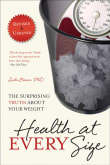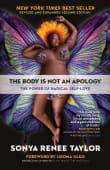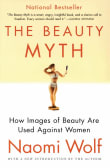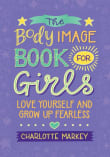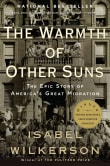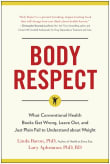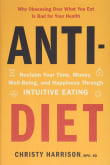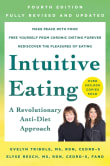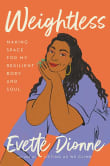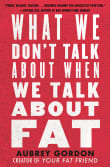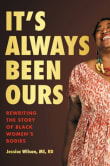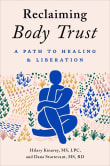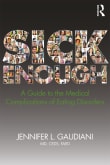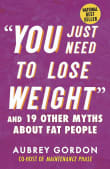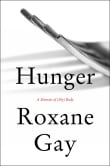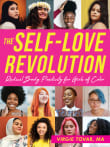Fearing the Black Body
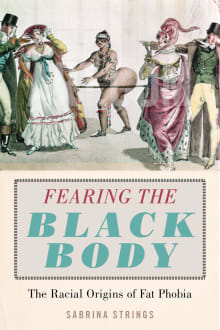
Book description
Winner, 2020 Body and Embodiment Best Publication Award, given by the American Sociological Association
Honorable Mention, 2020 Sociology of Sex and Gender Distinguished Book Award, given by the American Sociological Association
How the female body has been racialized for over two hundred years
There is an obesity epidemic in this…
Why read it?
8 authors picked Fearing the Black Body as one of their favorite books. Why do they recommend it?

This book profoundly moved me, opening my eyes to a concept I had never contemplated. This book explores the origins of weight stigma and anti-fatness while linking them to the history of the development of racism.
Patriarchy, white supremacy, and the false conclusion that black people who were brought to Europe to be slaves were inferior because of their “larger appetite for sex and food” is a stunning revelation. This book rocked my world and incited inner rage and a quest to right this wrong.
From Elyse's list on fighting diet wellness beauty and youth culture.

This book is a historical narrative that begins in the Renaissance of the 14th century and explores the relationship between Black women’s bodies and race.
It was an eye-opening and emotional book that made me grapple with my own body issues and how women negotiate their place in the larger society.
From Fatimah's list on that helped me on my social justice journey.

I track instances on Instagram of dress-coding—when girls and women are disciplined for wearing clothes considered “too” revealing. This occurs in schools with rules, for example, forbidding tank tops or crop tops, and on airplanes (for some reason, the sight of a woman wearing comfortable clothes is a trigger for many travelers). Black women are singled out as sexualized most often.
To find out why, I turned to this eye-opening book. Strings demonstrates a connection between racism and anxiety over fatness. She traces how Black and white women’s bodies came to be seen as essentially different from each other. Fatness…
If you love Fearing the Black Body...

Fearing the Black Body is a startling expose of how historical racism has shaped today’s fatphobia.
Historian Sabrina Strings offers a rousing account of how fat bodies have been valued differently over time, and why. During the Renaissance, women with plump physiques were the epitome of beauty, but fatness lost its luster when it was linked to Blackness during the 1700s with the expansion of slavery.
The cultural arbiters of the time—popular art, women’s magazines, and the medical establishment—promoted thinness as the new beauty standard for white women, a vehicle for moral superiority over Black women who were stereotyped as…
From Caroline's list on stop worrying about your body.

Dr. Sabrina Strings painstakingly tracks the historical evolution of the relatively recent prizing of the white, thin body, rightfully identifying the origins of the diet culture as a form of literal and figurative distancing from Black bodies.
This book was a wakeup call that made my anti-diet work even more urgent because it’s more than simply a health intervention, it’s a form of social justice and body liberation work.
From Jenna's list on reality-check your relationship with food and body.

Strings traces what is nearly the entire history of fatphobia as it pertains to the current state of affairs in the western world.
At the heart of fatphobia is racism and anti-Blackness, which is why people in engage in it so ferociously (as Strings shows you in her book).
From Clarkisha's list on to help you kill your inner fatphobe.
If you love Sabrina Strings...

This book completely changed the way I thought about diet culture and anti-fat bias. It helped me to better understand the racial origins of fatphobia and how our modern diet culture began hundreds of years ago. It is a must-read to understand how racism and colonialism impact all of our thoughts and beliefs about bodies to this day.
From Alissa's list on non-diets.

We’re so used to thinking about weight and bodies in certain ways that it can be disconcerting to realize we don’t truly understand why we think the way we do. Sabrina Strings’ book opened my eyes to the true origins of weight stigma in the U.S., and those origins shocked me. Our current concept of the ideal woman’s body—thin, white, able—developed and became entrenched as a way to differentiate white people from “others,” whether they were Black, Jewish, Irish, Italian, or in some other visible way not-white. That’s pretty much all there is to it. And once you understand that,…
From Harriet's list on weight and body image.
If you love Fearing the Black Body...
Want books like Fearing the Black Body?
Our community of 12,000+ authors has personally recommended 100 books like Fearing the Black Body.


